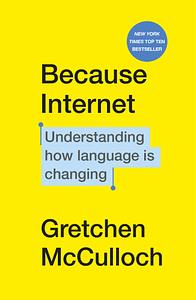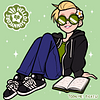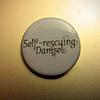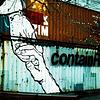You need to sign in or sign up before continuing.
Take a photo of a barcode or cover
funny
informative
lighthearted
fast-paced
I first heard of Gretchen McCulloch when she was resident linguist at The Toast (a website whose passing I'm still mourning, tbh); her analysis of doge-speak there (which is actually referenced here in the chapter on memes) may have been the first time I saw anybody apply linguistic analysis to internet culture. I love combining highbrow bits of academia with goofy bits of pop culture (see also the time in college my friends and I decided to conjugate "pwn" as a Latin verb — pwno, pwnare, natch), and stuff about language is my catnip anyway, so when I heard about this book, you bet it went to the top of my TBR.
And it does not disappoint! The book is more about big-picture stuff than minutiae — think "how chatting functions as communication" rather than "analyzing the orthography of lolspeak" — though there are plenty of entertaining details thrown in as well. I was particularly interested in her argument that emoji in chats fulfill much the same function as gestures in face-to-face conversations. It's not a connection I'd ever made on my own, but the way she lays it out makes a lot of sense and does seem to jibe with my own usage and observations. I also particularly appreciated her contextualizing so many of the shifts we're seeing not as unprecedented new phenomena and/or a sign of the impending apocalypse, but rather language and communication trends that have been around forever, just taking place in new contexts and mediated by new technology.
So if you're interested in learning more about "humanity's most spectacular open source project" and how it's growing and changing in the internet age, I definitely can't recommend this enough.
And it does not disappoint! The book is more about big-picture stuff than minutiae — think "how chatting functions as communication" rather than "analyzing the orthography of lolspeak" — though there are plenty of entertaining details thrown in as well. I was particularly interested in her argument that emoji in chats fulfill much the same function as gestures in face-to-face conversations. It's not a connection I'd ever made on my own, but the way she lays it out makes a lot of sense and does seem to jibe with my own usage and observations. I also particularly appreciated her contextualizing so many of the shifts we're seeing not as unprecedented new phenomena and/or a sign of the impending apocalypse, but rather language and communication trends that have been around forever, just taking place in new contexts and mediated by new technology.
So if you're interested in learning more about "humanity's most spectacular open source project" and how it's growing and changing in the internet age, I definitely can't recommend this enough.
hopeful
informative
reflective
medium-paced
I bought this book after writing an in depth essay about language. Although it didn’t cover as much in depth as I would’ve appreciated some of the nuances of internet culture - like the discord chat feature for example - the author did something much better. This book celebrates language - while most are regarding language changes hesitantly, McCulloch encourages us to embrace it because that’s the magic of language - it is fluid and dynamic. For me, this is a perspective not heard enough and I how she displayed it through internet language examples. I only wish she had dove deeper. That however, would be even more of a literary challenge and I appreciate the work the author did to present the overarching trends of the internet communication.
Lots of rich examples of early internet writing, how it links to, but is different than, other informal writing that happened pre-internet. Both linguistics, but also social experience to a great extent, since language is formed in talking with other people - so this was a good look at trends and changes.
In particular - I really liked the chapter on 'Internet people' and the starting question, "Can you make friends on the internet?" So fascinating reading about the transition from 'pre-internet people' to 'full internet people' and the differences in writing and what assumptions are made about who can 'do what' on the internet. In this chapter, the writing and description wasn't really just about language, but about how people use, explore, and engage with the internet. As [technological] creators with coding and hardware skills, or perhaps as makers and content creators with more editing text or video) skills.
And closely behind, I enjoyed the chapter on emojis. I came late to the game on smart phones (my first in 2015). Somehow, I always feel that I don't quite understand the emoji language fully and reading this chapter on origin, substitutes and their links to the spoken language idea of 'emblem' was also a good view.
Really enjoyed this book!
In particular - I really liked the chapter on 'Internet people' and the starting question, "Can you make friends on the internet?" So fascinating reading about the transition from 'pre-internet people' to 'full internet people' and the differences in writing and what assumptions are made about who can 'do what' on the internet. In this chapter, the writing and description wasn't really just about language, but about how people use, explore, and engage with the internet. As [technological] creators with coding and hardware skills, or perhaps as makers and content creators with more editing text or video) skills.
And closely behind, I enjoyed the chapter on emojis. I came late to the game on smart phones (my first in 2015). Somehow, I always feel that I don't quite understand the emoji language fully and reading this chapter on origin, substitutes and their links to the spoken language idea of 'emblem' was also a good view.
Really enjoyed this book!
Very interesting examination of trends and norms that I’m familiar with myself, including plenty of things I couldn’t articulate myself.
I should not have listened to the audiobook though—by its nature, internet language is meant to be read, not spoken. Imagine someone needing to say “I can has teh loooools
I should not have listened to the audiobook though—by its nature, internet language is meant to be read, not spoken. Imagine someone needing to say “I can has teh loooools
As someone who never formally studied linguistics but considers herself a nerd for it, and is addicted to videos about linguistics on YouTube, I was really blown away by how good this book is at introducing linguistic concepts in an understandable and workable way before moving on to the specifics. I found the actual content fascinating too, but the writing itself is fantastic.
As a Millennial who's pretty fluent in internet, it was also really refreshing to see all the language in this used right (since the writer is a native speaker, so to say) and handled with a balance of academic value and self awareness about what it is.
I'm sure some people would have liked the book to go deeper into some concepts, but I'd highly recommend it, and would love to read anything by this writer in the future.
As a Millennial who's pretty fluent in internet, it was also really refreshing to see all the language in this used right (since the writer is a native speaker, so to say) and handled with a balance of academic value and self awareness about what it is.
I'm sure some people would have liked the book to go deeper into some concepts, but I'd highly recommend it, and would love to read anything by this writer in the future.
4.5/5 As a fan of pop culture explained through academia, this book was right up my alley! I loved learning about the history of internet slang and how it develops and the impact it has on language. Linguistics is so much fun!
funny
informative
inspiring
medium-paced
funny
informative
reflective
medium-paced
funny
informative
reflective
medium-paced
Really fascinating read! I learned quite a lot from this book that made me think about my own experiences with Internet-enabled communication.





